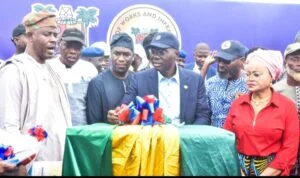The Ministry of Finance Incorporated (MOFI) has announced that the Federal Government’s investment assets, now valued at ₦38.3 trillion, are undergoing a comprehensive audit and reform process aimed at strengthening transparency, corporate governance, and performance across public enterprises.
The disclosure was made by MOFI’s Chief Executive Officer, Dr. Armstrong Takang, during the inauguration of the 2025 Guidelines on Corporate Governance by the Nigerian Communications Commission (NCC) on Wednesday in Lagos.
Decades of Poor Asset Management
Takang lamented that for many years, Nigeria lacked a proper and verifiable record of its public investment assets.
“When we started this process, the records showed only ₦1.5 trillion in value for government-owned assets,” he said. “But after assessing just 20 of those assets, we identified ₦38.3 trillion in net asset value.”
He added that the lack of proper documentation, transparency, and accountability led to the mismanagement or underutilisation of many state-owned enterprises (SOEs), some of which have now collapsed.
Takang cited notable failures such as:
Nigerian Airways
Ajaokuta Steel
Delta Steel
“We spent billions of dollars to establish these companies. Yet today, some are ghost towns—no value is coming back to the Nigerian people,” he said.
Root Cause: Weak Corporate Governance
According to Takang, the collapse of several state-owned entities can be traced to the absence of robust corporate governance structures, including lack of financial accountability, absence of performance reporting, and unchecked management discretion.
“Those who managed these companies often behaved as if they were not answerable to anyone. There were no audited financials, no performance metrics, and no consequences for failure,” he stated.
MOFI’s Strategic Reforms
To address these issues, MOFI is implementing several key reforms:
✅ National Asset Registry
A comprehensive asset registry is being developed to track all public investment assets owned by the Federal Government. The registry will detail:
What the government owns
Where the assets are located
Their financial value
Who manages them
Their performance metrics
“This isn’t just about record-keeping. It’s about transparency and accountability. Every Nigerian deserves to know what the government owns and what returns we are getting,” said Takang.
✅ Corporate Governance Scorecard
MOFI has also launched a corporate governance scorecard to evaluate the performance of SOEs. The scorecard assesses:
Transparency
Dividend payments
Capital growth
Liquidity
Social and community impact
An independent evaluation team, including experts from the Financial Reporting Council, Institute of Directors, and Society for Corporate Governance, will ensure objectivity in assessments.
“We want to know whether these companies are growing in value, creating jobs, paying dividends, and operating like real businesses,” he added.
Nigeria Must “Play in the Premier League”
Takang emphasized that sound corporate governance is critical to Nigeria’s aspiration of becoming a $1 trillion economy.
“We cannot behave like we’re in the third division. We must act like those in the premier league—with discipline, structure, and accountability,” he said.
He argued that public assets should not be sold because they’ve failed, but rather after they’ve succeeded and become self-sustaining.
“Strong institutions, good governance, and proper asset management are the foundation for economic growth, job creation, and national pride,” he concluded.
“A rich man in a poor country is still poor. If we want respect for our country and our people, we must build a strong economy—and that starts with managing what we already own.”
























